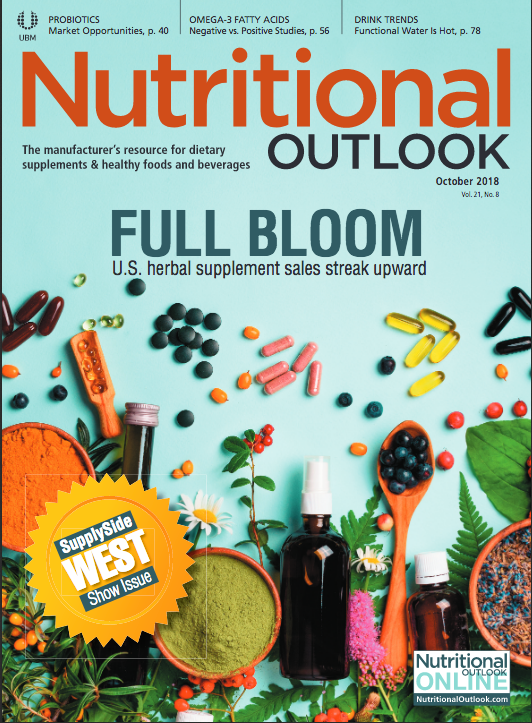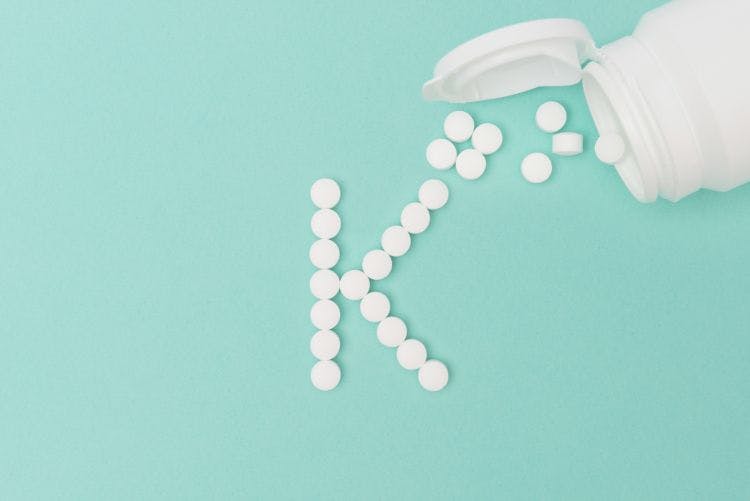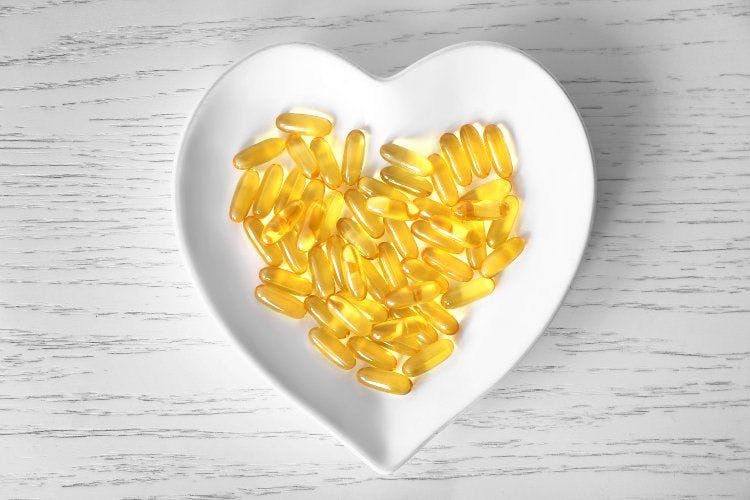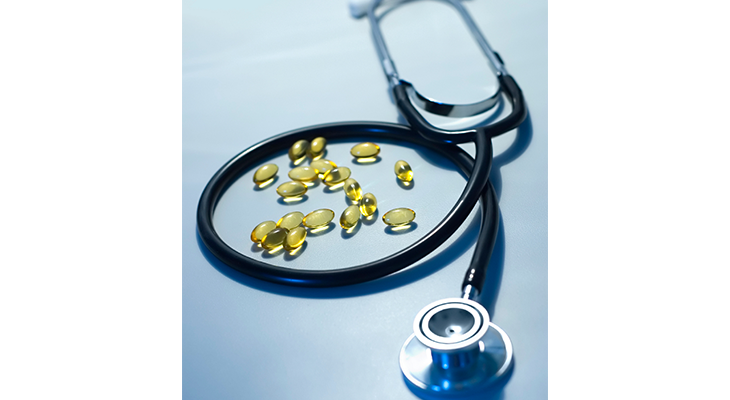Bright outlook for mood supplements
New research and market stats demonstrate that mood supplements are both in demand and effective.
Photo © AdobeStock.com/Alexey Nazvin
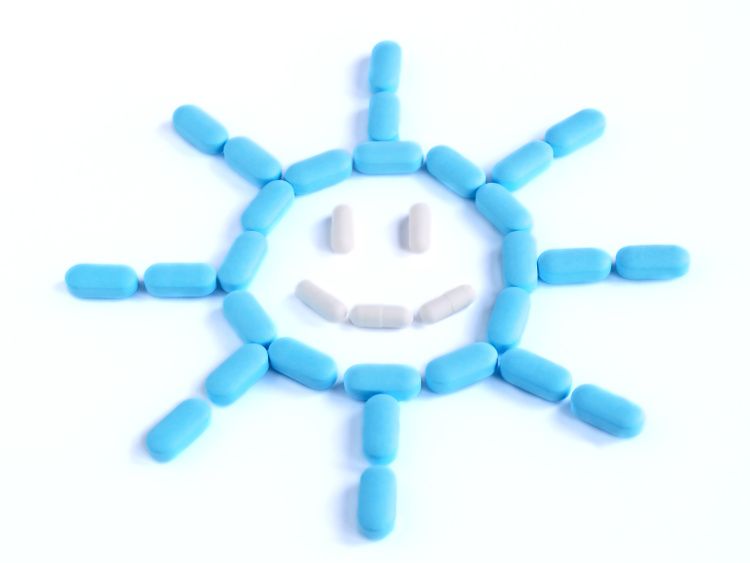
Mood-boosting supplements are increasingly popular as modern lifestyles become more demanding and stressful. This growth is giving rise to copious amounts of new research and innovative products.
Sam Kwon, president of Vesta Pharmaceuticals (Indianapolis, IN), says that current sales trends in the mood and anxiety supplement space are moving the market toward sustainable, clean-label, natural ingredients that consumers-Millennials, in particular-prefer over pharmaceuticals.
“People are more stressed than ever,” Kwon says, “and consumers are looking for a supplement to help them relax, decrease stress, and reduce depressive symptoms.”
Consumers also prefer more convenient product formats that can be consumed quickly. “That’s why functional foods…and performance drinks are emerging as popular product formats,” Kwon adds. “Consumers still prefer something easy that they can take at the start or end of the day without an unpleasant taste or cumbersome wrapper.”
The global brain health market is expected to be worth USD $11.6 billion in 2024, expanding at a compound annual growth rate of 19.6%, according to Research and Markets.1 While the mood and anxiety niche is only one piece of the overall brain health market, these emotional health and wellness supplements are also expected to see significant growth as research continues to prove the value of mood-boosting supplements. As the mood supplement space continues to grow, expect these six ingredients to become top performers.
Ashwagandha
A staple of Ayurvedic medicine, ashwagandha (Withania somnifera) is quickly gaining popularity in the United States as a mood enhancer and stress-reduction supplement thanks to its adaptogenic properties. In September, the American Botanical Council (Austin, TX) published its HerbalGram Herb Market Report on 2017 U.S. retail sales of herbal supplements, reporting that ashwagandha sales in the natural retail channel grew 25.6% in 2017 to $10.6 million.
George Polson, PhD, is the vice president of technology for Innophos (Cranbury, NJ). Polson says that ashwagandha’s growth in the West is being driven by Americans’ need for stress-reduction and mood-support supplements. “Adaptogens like ashwagandha help to protect the body against emotional and physical stressors,” Polson says. “Clinical trial research is demonstrating that ashwagandha’s health benefits are now based on science-backed testing, not just traditional use.”
One randomized, double-blind, placebo-controlled clinical trial followed 98 men and women between the ages of 18 and 60 for 60 days.2 Participants were evaluated on a modified Hamilton anxiety scale (mHAM-A) prior to the trial and were admitted to the trial if they scored between 24 and 42, which indicates moderate stress or anxiety.
Participants were then randomly assigned to one of four dosage groups and were given varying dosages of ashwagandha extract. The ashwagandha extract used in the study, Sensoril (also called Essentra), is proprietary to Natreon Inc. (New Brunswick, NJ) and distributed by NutraGenesis LLC (Brattleboro, VT). (Innophos acquired NutraGenesis last year.) Group A (n=30) received a once-daily 125-mg dose, Group B (n=35) received the same 125-mg dose twice per day, Group C (n=35) received a 250-mg dose twice per day, and Group D (n=30) received a placebo. Participants were assessed for mHAM-A scores at days 0, 30, and 60, and for serum cortisol, dehydroepiandrosterone sulfate (DHEAS), C-reactive protein, fasting blood glucose, serum total cholesterol, serum triglycerides, serum low-density lipoprotein cholesterol (LDL-C), serum very-low-density lipoprotein cholesterol (VLDL-C), and serum high-density lipoprotein cholesterol (HDL-C) at days 0 and 60.
All experimental groups reported a statistically significant increase in subjective feelings of well-being at day 30 and day 60. All experimental groups also showed significant decreases in mHAM-A scores relative to the placebo group, with higher doses of Withania somnifera associated with greater score reductions. Group A exhibited a 62.2% reduction in mHAM-A scores (P<0.001) after 60 days, while the placebo group did not exhibit a statistically significant change.
Natreon funded this study. Polson says this study showcased Sensoril ashwagandha’s stress-reducing properties. “For both doses, consumption of Sensoril extract resulted in significant reductions in serum levels of the stress hormone, cortisol, as well as improvements in self-reported levels of stress and anxiety. Generally, higher doses provided greater benefits, but both doses had statistically significant effects compared to the placebo group.”
Benny Antony, PhD, is the joint managing director for Arjuna Natural Ltd. (Kerala, India). Antony says that Withania somnifera has demonstrated itself effective in alleviating anxiety through multiple pathways. “W. somnifera has traditionally been used as a tranquilizer,” Antony says. “Animal and human studies have demonstrated its anti-stress, anti-anxiety, monoamine-modulating, and cortisol-lowering properties. Ashwagandha extracts show promise as a potential adjunctive treatment for cognitive impairments as well as mood exacerbations.”
Shaheen Majeed, worldwide president of Sabinsa (East Windsor, NJ), says that ashwagandha is thought to act through the hypothalamic-pituitary-adrenal axis to alleviate stress-induced insomnia and fatigue. In one animal study, ashwagandha was found to induce differential activation of multiple types of GABA receptors, which the study authors say could explain ashwagandha’s adaptogenic properties.3
Majeed says he expects the mood and anxiety supplement market to continue growing due to the inherent complexity of the human condition. “Hectic lifestyles, confusing current events, and the normal ups and downs of life all contribute to increased incidence of anxiety and mood disruptions. This has increased the demand for anti-anxiety products, especially natural alternatives. The World Health Organization has projected that depression will be the second leading cause of disability worldwide4, and given the growing preference for natural alternatives, the specialized sector of herbal brain health supplements has a significant role to play in improving human life.”
Probiotics
Probiotics are a recent entry to the mood supplement category, but their entry is supported by science. Research demonstrating the gut-brain connection and an increase in consumer awareness around probiotics are paving the way for probiotic mood supplements.
Tom Bayne, DC, is a chiropractic physician and scientific advisor for Probiogen (Scottsdale, AZ). Bayne says that the gut-brain connection is more powerful than was previously known, which is why probiotics are ideal for the mood supplement market. “Research has shown that gut bacteria can produce their own neurotransmitters and essentially hijack the brain,” Bayne says. “This can trigger food cravings, feelings of anxiety, feelings of depression, and other mood imbalances.”
Bérengère Feuz, marketing director for Lallemand Health Services (Montreal, QC, Canada), notes that probiotics are gaining popularity as mood supplements due to their efficacy as well as their tolerability. She cites the results of a double-blind, placebo-controlled, randomized clinical trial on 110 patients with major depressive disorder that found an eight-week course of probiotic supplementation improved Beck Depression Inventory (BDI) scores relative to a placebo.5
Eighty-one subjects completed the trial. This trial separated participants into prebiotic (n=27), probiotic (n=28), and placebo (n=26) groups. Participants were administered either 1) 5 g of a probiotic supplement containing Lactobacillus helveticus and Bifidobacterium longum probiotic strains, 2) 5 g of a prebiotic supplement containing galactooligosaccharide, or 3) a matching placebo, once daily for eight weeks. Participants were assessed for serum tryptophan and branched-chain amino acids (BCAAs). Researchers recorded participants’ dietary intake and physical activity at baseline. Relative to a placebo, probiotic supplementation resulted in a statistically significant decrease in BDI score (p=0.042), while prebiotic supplementation failed to produce a statistically significant effect.
Says Feuz: “Last June, Caroline Wallace from Queen’s University (Kingston, ON, Canada) revealed at Probiota Americas the promising results of this pilot study on Lallemand’s probiotic formulation on symptoms of depression in treatment-naïve depressed patients. This study and others like it reinforce the scientific basis of this probiotic formulation for alleviating both physiological6 and psychological7 symptoms of chronic stress.”
Saffron Extract
Saffron extract (Crocus sativus) is quickly gaining popularity as a mood supplement thanks to its strong performance in clinical trials. Sebastien Merchet, nutrition business development manager, North America, for Seppic (Fairfield, NJ), says that saffron extract’s mood-boosting and anxiolytic properties have been demonstrated in more than 10 clinical trials.
Says Merchet: “Studies have even shown that saffron extract may provide similar effectiveness to well-known pharmaceutical mood stabilizers, such as fluoxetine and imipramine, without the side effects. These clinical studies showed that the mood-stabilizing effects were linked to multiple native actives from saffron, including safranal, crocin, crocetin, picrocrocin, and other derivatives present in sargol, the richest part of saffron.”
A 2014 research review of six randomized, double-blind, placebo-controlled clinical trials found that “saffron had large treatment effects and, when compared with antidepressant medications, had similar antidepressant efficacy.”8
Seppic is the exclusive distributor of Activ’Inside products for North America. Merchet says that Activ’Inside’s branded saffron extract, Safr’Inside, contains 10 times more safranal than generic saffron extracts when measured by HPLC, and has standardized concentrations of 25 native active compounds associated with saffron’s mood-stabilizing properties that Activ’Inside has dubbed “Safromotivines.”
Merchet says the mood and anxiety supplement market is diversifying its product formats, with powdered drinks quickly becoming popular. “Chewables, gummies, and other formats are also trending, but powders are quite popular. Consumers want to be able to prepare their own drink, yogurt, or shake-and making your own recipe might be relaxing in and of itself.”
Last year, another saffron supplier, Pharmactive Biotech Products (Madrid, Spain), a partner of Gencor (Irvine, CA), funded a first-of-its-kind clinical study on the effects of the company’s proprietary, patented Affron ingredient in an adolescent population. Researchers found that Affron may help reduce depression and anxiety symptoms in teenage children and improved feelings of separation anxiety, social phobia, and depression in young people. The company says Affron is the first saffron extract standardized by HPLC to Lepticrosalides, the trademarked bioactive compounds said to help to improve mood disorders.
The randomized, double-blind, placebo-controlled study8 included 68 young people between the ages of 12-16 with mild-to-moderate anxiety or depressive symptoms. According to data from the World Health Organization, the study authors write, psychiatric disorders including anxiety and depression are among the leading causes of disability in young people, with as much as 15%-20% of the youth population experiencing an anxiety or depressive disorder before the age of 18. Saffron, they add, has been shown to be effective in reducing feelings of depression and anxiety in adults with mild-to-moderate depression; however, saffron for depression and anxiety had not yet been studied in a youth population prior to publication of the current study, they said.
The researchers divided participants into two groups. One group received 14 mg Affron, while another group received the same dosage of a placebo. Both group were instructed to take one tablet of either Affron or the placebo twice daily for a total of eight weeks. In order to determine what effects supplementation with Affron had on parameters of anxiety and depression, participants completed a 47-item questionnaire called the Revised Child Anxiety and Depression Scale (RCADS). RCADS includes subscales on separation anxiety, social phobia, general anxiety, panic, obsessions and compulsions, and depression. Subjects’ parents also completed the parent-report version of RCADS; those results served as the secondary outcome measure.
The group supplemented with Affron reported improvements in overall internalizing symptoms, separation anxiety, social phobia, and depression, compared with the placebo group. Parental reports of improvement in the subjects’ mental health were inconsistent. The researchers thus concluded that “administration of a standardized saffron extract (Affron) for eight weeks improved anxiety and depressive symptoms in youth with mild-to-moderate symptoms, at least from the perspective of the adolescent.” Affron was also found to be safe and well-tolerated.
The study authors write that while the results are encouraging, the self-reporting nature of this study represents a limitation. The limited study duration, single treatment dose, and non-clinical sample used in this study likewise limit the overall generalizability of the results, warranting the need for further investigation. Pharmactive Biotech Products funded the study.
Imke Marks, commercial director of Pharmactive Biotech Products, says that combination saffron products, such as with curcumin, are also gaining in popularity due to their increased efficacy relative to single-ingredient products.
SAMe and 5-MTHF
Lorena Carboni, product support specialist for Gnosis S.p.A. (Desio, Italy), says that SAMe (S-adenosyl-L-methionine) and L-methylfolate (5-MTHF) are continuing to enjoy privileged positions as top sellers in the mood and anxiety supplement market due to the critical roles they play in the methylation process of monoamines.
“In particular,” Carboni says, “SAMe may improve depressed mood through enhanced methylation of catecholamines and increased serotonin turnover, reuptake inhibition of norepinephrine, enhanced dopaminergic activity, decreased prolactin secretion, and increased phosphatidylcholine conversion.”
Carboni points to a 2016 literature review and meta-analysis that shows SAMe and 5-MTHF are effective adjuncts to antidepressant medications in reducing the occurrence of depressive symptoms.9 Folate deficiency is common among people with depressed mood, Carboni says; however, not just any folate supplement will be effective in supporting emotional health. Carboni explains that according to studies like one published in the Journal of Psychopharmacology10, not all consumers will benefit from the same kind of folate supplement.
“Up to 70% of patients with depression test positive for a polymorphism of the MTHFR enzyme,” Carboni says, “which means they cannot convert folic acid into L-methylfolate. For that reason, the active form of folate (5-MTHF) is the right approach to raise folate levels, instead of folic acid that is biologically non-active.”
Carboni sees the mood and anxiety supplement market moving toward more natural ingredients in the future, and expects that consumers will first pursue naturally sourced supplements before attempting pharmaceuticals.
CBD
Bayne notes that hemp cannabidiol (CBD) from Cannabis sativa is becoming competitive as a mood supplement ingredient due to the fact that it induces the same calming effects as marijuana, but without the psychoactive tetrahydrocannabinol (THC). Stuart Tomc, vice president of human nutrition for CV Sciences Inc. (Las Vegas, NV), says that hemp extracts have become a go-to product in the mood and anxiety supplement market.
Says Tomc: “Consumers are actively seeking natural alternatives to pharmaceuticals that induce rapid, sustained effects with better safety profiles. Hemp extracts are trending for these applications because they are natural, safe, and effective.”
While Tomc says CBD oil softgels are currently an industry favorite, the cannabinoid industry is quickly launching new product formats that are expected to greatly disrupt existing offerings as research continues to prove out the mood-boosting benefits of CBD. In September, CV Sciences made a milestone announcement, stating it secured the industry’s first Generally Recognized as Safe (GRAS) self-affirmation for a hemp extract, for its PlusCBD Gold Formula.
“CV Sciences is the only hemp CBD nutraceutical company to invest in the scientific evidence necessary to achieve this sought-after designation, recognizing an ingredient as presumably safe among experts under the conditions of its intended use,” the company said in a press release. At the same time, the company announced that its PlusCBD Oil launched what the company says is the industry’s first CBD gummy in the natural products space.
Tomc speaks to CBD research findings. “A landmark paper published in June 201811 presented data supporting CBD as a new fast-acting option,” Tomc explains. “The rapid antidepressant effect was accompanied by an increase in brain-derived neurotrophic factor levels as well as markers of synaptic plasticity. CBD potentiated nerve growth factors and new neuron-to-neuron connections, making it one of the most promising tools in our natural mental health toolbox.”
The study that Tomc references is an animal experiment on male Swiss mice and Wistar rats. The animal study involved administering injections of CBD at concentrations of 7, 10, and 30 mg/kg, or an inert vehicle at 10 ml/kg, to groups of mice or rats. Group size varied from n=6 to n=13. The mice and rats were then subjected to the forced swim test and the learned helplessness paradigm, and were assessed for changes in postsynaptic density protein 95 (PSD95) and brain-derived neurotrophic factor (BDNF) levels.
The experiment found that administration of CBD increased BDNF levels and markers of synaptic plasticity, while also reducing immobility time during the forced swim test. The study authors concluded that CBD induces a rapid and long-lasting antidepressant effect.
Tomc says that CBD products are already becoming category leaders, with retailers reporting that they are receiving weekly pitches from new hemp startups. Tomc explains this “green rush” signals the successful evolution of hemp into a mainstream health and wellness product.
“Any health food store that sells hemp CBD products will tell you that hemp CBD extract is the bestselling and most effective product to hit store shelves, ever,” Tomc says. “We’re seeing tremendous competition among cannabinoid-based products, and we expect massive disruption for preexisting offerings.”
Market statistics confirm Tomc’s claims. Market research firm Technavio (London, UK) predicts that global annual sales of CBD oil products will reach $2.7 billion USD by 202212, growing at a compound annual rate of 31%.13 And in September, the nonprofit group Vote Hemp (Washington, DC) released predictions from a new Hemp Business Journal report that total U.S. retail sales of hemp-derived CBD products will surpass $646 million by 2022.
Positive Space
The mood and depression supplement category is expected to see significant growth in the coming years, making it an ideal market segment for new innovations and new products. Manufacturers and brands need to invest in quality science and effective marketing. Many opportunities lie ahead for brands that can meet this challenge.
Sidebar: Not all companies moving forward with CBD
Shaheen Majeed, worldwide president of Sabinsa (East Windsor, NJ), says that while hemp cannabidiol (CBD) is becoming a competitive anti-anxiety ingredient, some companies like Sabinsa are hesitant to enter the CBD space due to CBD’s unresolved legal status. FDA did recently approve GW Pharmaceuticals’ Epidiolex CBD drug to treat severe forms of epilepsy, Lennox-Gastaut syndrome and Dravet syndrome, and the DEA is now in the process of determining whether CBD will be reclassified as a Schedule II or Schedule III drug.14 Until these regulatory questions are resolved, however, some manufacturers and brands may consider their opportunities to be limited.
Says Majeed: “CBD’s popularity is growing for issues like anxiety and pain. It is also thought to be neuroprotective. In June 2018, the U.S. FDA approved the oral use of cannabidiol as an anti-seizure drug for use in rare and severe forms of childhood epilepsy. It was also approved by Health Canada in 2005 for addressing the pain associated with multiple sclerosis. However, as of this date cannabidiol remains a Schedule I drug under U.S. federal law (Schedule II in Ohio), and therefore Sabinsa is not active in this category.”
Sidebar: Mood supplements may be unconventional solution to societal problems
Depression and anxiety are only two aspects of mood regulation, and new research into omega-3 fatty acids is opening up potential new avenues of addressing other aspects of mood dysfunction. A recent randomized, double-blind, placebo-controlled, stratified, parallel-group clinical trial on 200 children between 6 and 16 years of age, and 139 adult caregivers, examined the effects of omega-3 supplementation on aggressive behavior in the children and intimate partner violence in the adults.15
All participants received a 200-ml dose of a liquid omega-3 supplement. The experimental group (n=100) also received an additional 1 g of omega-3 fatty acids, while the control group (n=100) received a matching placebo. Participant aggression was measured using the physical assault and psychological aggression subscales of the Conflict Tactics Scales, and omega-3 concentration was assessed through blood analysis.
The study authors found that omega-3 supplementation resulted in long-term statistically significant reductions in psychological aggression and psychopathic tendencies in adult caregivers as measured via the Conflict Tactics Scales. While the study authors note several limitations to the trial and claim their current findings require replication, they also highlight several strengths of the study. The trial had a longer duration, a lower attrition rate, and better compliance relative to prior studies.
References:
- Research and Markets. “Global $11.6 Billion Brain Health Supplements Market to 2024.” www.prnewswire.com/news-releases/global-116-billion-brain-health-supplements-market-to-2024-300517802.html. Accessed August 23, 2018.
- Auddy B et al. “A standardized Withania somnifera extract significantly reduces stress-related parameters in chronically stressed humans: A double-blind, randomized, placebo-controlled study.” Journal of the American Nutraceutical Association, vol. 11, no. 1 (January 2008): 51-57
- Candelario M et al. “Direct evidence for GABAergic activity of Withania somnifera on mammalian ionotropic GABAA and GABAÏ receptors.” Journal of Ethnopharmacology, vol. 171 (August 2015): 264-272. Published online June 9, 2015.
- Kessler RC et al. “The epidemiology of depression across cultures.” Annual Review of Public Health, vol. 34 no. 1 (2013): 119-138
- Kazemi A et al. “Effect of probiotic and prebiotic vs placebo on psychological outcomes in patients with major depressive disorder: A randomized clinical trial.” Clinical Nutrition. Published online April 24, 2018.
- Diop L et al. “Probiotic food supplement reduces stress-induced gastrointestinal symptoms in volunteers: A double-blind, placebo-controlled, randomized trial.” Nutritional Research, vol. 28, no. 1 (January 2008): 1-5
- Messaoudi M et al. “Assessment of psychotropic-like properties of a probiotic formulation (Lactobacillus helveticus R0052 and Bifidobacterium longum R0175) in rats and human subjects.” British Journal of Nutrition, vol. 105, no. 5 (March 2011): 755-764
- Lopresti AL et al., “Affron, a standardized extract from saffron (Crocus sativus L.) for treatment of youth anxiety and depressive symptoms: a randomized, double-blind, placebo-controlled study,” Journal of Affective Disorders. Published online February 26, 2018.
- Sarris J et al. “Adjunctive nutraceuticals for depression: A systematic review and meta-analyses.” The American Journal of Psychiatry, vol. 173, no. 6 (April 2016): 575-587
- Kelly CB et al. “The MTHFR C677T polymorphism is associated with depressive episodes in patients from Northern Ireland.” Journal of Psychopharmacology, vol. 18, no. 4 (December 2004): 567-571
- Sales AJ et al. “Cannabidiol induces rapid and sustained antidepressant-like effects through increased BDNF signaling and synaptogenesis in the prefrontal cortex.” Molecular Neurobiology, vol. 55 no. 6 (June 2018): 1-12
- Technavio. “Global CBD Oil Market 2018-2022.” July 2018.
- Technavio. “Global CBD Oil market 2018-2022 to Post a CAGR of 31%.” Published online July 23, 2018.
- Brodwin, E. “A drug derived from marijuana has become the first to win federal approval, and experts predict an avalanche effect.” Business Insider. Published online June 25, 2018.
- Portnoy J et al. “Reductions of intimate partner violence resulting from supplementing children with omega-3 fatty acids: A randomized, double-blind, placebo-controlled, stratified, parallel-group trial.” Aggressive Behavior, vol. 44, no. 5 (September/October 2018): 491-500
